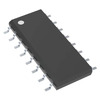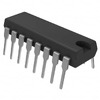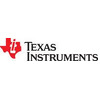Manufacturer Part Number
SN74LS595DR
Manufacturer
Texas Instruments
Introduction
The SN74LS595DR is a high-performance logic shift register designed for sequential logic operations, primarily in high-speed computing and data manipulation tasks.
Product Features and Performance
High-speed operation
Serial to Parallel, Serial functionality
8-bit shift register with tri-state outputs
Logic Type: Shift Register
Supports a wide voltage supply range of 4.75V to 5.25V
Robust operating temperature range from 0°C to 70°C
Advanced 74LS technology for superior logic operations
Product Advantages
Improved data handling and storage efficiency
Flexible voltage requirements for diverse circuit designs
Reliable performance in a broad range of environments
Easy to integrate into existing systems due to standard SOIC packaging
Key Technical Parameters
Voltage Supply: 4.75V ~ 5.25V
Operating Temperature: 0°C ~ 70°C
Number of Elements: 1
Number of Bits per Element: 8
Output Type: Tri-State
Mounting Type: Surface Mount
Package / Case: 16-SOIC
Quality and Safety Features
Manufactured by Texas Instruments, ensuring high reliability and performance
Compliant with industry standards for safety and quality assurance
Compatibility
Compatible with a wide range of digital circuits and microcontrollers
Designed for easy integration with standard surface mount technologies
Application Areas
Data processing
Communication systems
Instrumentation
Control systems
Digital signal manipulation
Product Lifecycle
Status: Active
Ongoing support and availability from Texas Instruments
Not currently nearing discontinuation, with continued production and support expected
Several Key Reasons to Choose This Product
Industry-leading performance and reliability from Texas Instruments
Enhanced data handling capabilities for complex operations
Wide operating temperature and voltage range for versatile applications
Easy integration into a variety of electronic systems due to standard packaging and specifications
Ongoing product support and availability, ensuring long-term usability




 SN74LS619NTexas Instruments
SN74LS619NTexas Instruments SN74LS593NTexas InstrumentsIC BINARY COUNTER 8-BIT 20DIP
SN74LS593NTexas InstrumentsIC BINARY COUNTER 8-BIT 20DIP SN74LS612NTexas InstrumentsPARALLEL I/O PORT, 12 I/O, TTL
SN74LS612NTexas InstrumentsPARALLEL I/O PORT, 12 I/O, TTL SN74LS623DWTexas InstrumentsIC TXRX NON-INVERT 5.25V 20SOIC
SN74LS623DWTexas InstrumentsIC TXRX NON-INVERT 5.25V 20SOIC